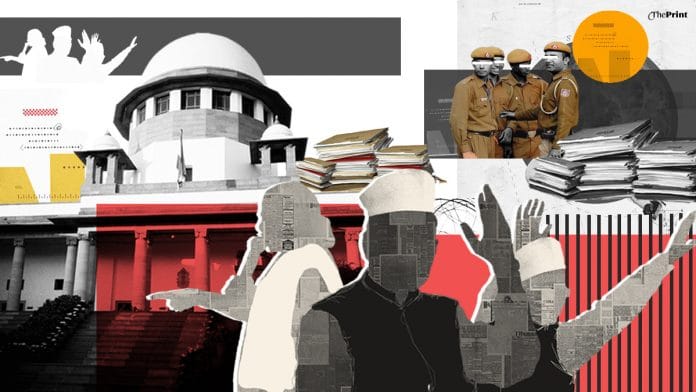The Supreme Court in a judgement Thursday directed political parties to declare, on their sites and social media, the details of criminal cases pending against their Lok Sabha and assembly poll candidates within 48 hours of their selection. The court said that winnability alone cannot be justification for selection, and asked the parties to reveal other reasons.
ThePrint asks: SC on criminal candidates: Should it be questioning political parties on their selection?
SC should instead focus on filling the gap in legislation, which is its right as well as duty
 Jagdeep Chhokar
Jagdeep Chhokar
Founder, Association for Democratic Reforms
Rather than questioning political parties on their selection of candidates, the Supreme Court should focus on filling the gap in legislation, which the Parliament is not going to do. What is needed is an amendment of the Representation of the People Act, 1951 to bar candidates from contesting in cases where: (a) serious/heinous cases are pending against them, where the specified punishment is imprisonment for two or four years (b) the cases should have been registered at least six months (or one year) before the announcement of the election dates and (c) charges have been framed by a court of law, from contesting elections till the charges have been cleared.
I don’t know why the Supreme Court has been shying away from filling that gap in legislation that is its right as well as its duty. This principle of filling the gap has been followed in the Association for Democratic Reforms’ own case in 2002. In September 2018, the Supreme Court came out with a similar unfeasible judgement, but it wasn’t implemented because there was no body assigned to enforce the verdict.
The Supreme court does not understand the enormity of the issue and the impact it has had on public interest. I also think that political parties should be brought within the ambit of RTI. In fact, the Central Information Commission, the highest statutory body for RTI, proposed this in 2013. But that case is still pending in the Supreme Court.
SC doesn’t have moral authority to demand transparency from political parties, look at its own record
 Alok Prasanna Kumar
Alok Prasanna Kumar
Senior Resident Fellow, Vidhi Centre for Legal Policy
The Supreme Court should not be questioning political parties’ choices of selecting candidates in an election. At the most basic level, it leaves the court open to the charge of naked hypocrisy. India’s highest judiciary body, which consistently refuses to share information with the public about its own appointment process, simply does not have the moral authority to be taken seriously when it demands transparency from political parties. Even the very little transparency it afforded to the rest of us by making public the minutes of the collegium’s meetings, has been reversed suggesting that the court believes itself to be above constitutional norms or principles of transparency. Its latest judgement is likely to be ignored or fulfilled trivially, further eroding its own credibility.
The futile attempts to “de-criminalise” politics by placing the burden on political parties also points to a very elitist mindset of the Supreme Court. It proceeds from the assumption that the electorate is ill-informed and will magically stop voting for criminals if they had the said information, but countless studies have shown otherwise. It is time the court stops insulting the intelligence of the Indian voter.
The Supreme Court should remember that democracy has survived in the country so far because of the wisdom of the average voter in India.
SC’s verdict will entitle people to know about candidates. Informed citizenry necessary for a healthy democracy
 Ishkaran Bhandari
Ishkaran Bhandari
Advocate
The Supreme Court’s endeavour has been to curb corruption and bring transparency in India’s political system. This deserves credit. However, it should make a distinction between minor offences and heinous crimes.
At times, candidates get slapped with criminal charges when they take part in political agitations or student union protests. In such situations, they face action under Section 144 of the CrPC for unlawful assembly or so. These are qualitatively different from committing murder, rape or serious crimes that involve punishment of seven years imprisonment or more.
So, candidates shouldn’t be barred from contesting elections unless they are convicted by a court for committing crime. The court should also recognise that political rivals may initiate investigations and so barring individuals at the state of a charge sheet is also unfeasible.
The Supreme Court’s judgement deserves credit also because it entitles the public to know information about candidates and representatives. Additionally, political parties should broadcast information on all modes of communication to the public in instances where they are likely to give criminal candidates a ticket. Informed citizenry is necessary for a healthy democracy.
SC has rightly put onus on political parties to establish whether they are part of the problem or the solution
 Chakshu Roy
Chakshu Roy
Head of legislative and civic engagement, PRS Legislative Research
Political parties control people’s choices of candidate in an election. The selection is critical in the first-past-the-post electoral system in which the winning candidate is from a political party (independent candidates rarely win) and doesn’t usually get a majority of the vote share. This, and there are still limited mechanisms in India’s democracy that hold political parties accountable. In fact, there is no mention of political parties in the Indian Constitution other than in the Tenth Schedule with respect to the anti-defection law.
Many attempts have been made to rid our democracy of politicians with criminal records. Twenty years ago, the Supreme Court made it mandatory for candidates to declare their criminal records. The Representation of the People Act, 1951 has also been strengthened to ensure that those who convicted in serious cases are not able to continue as legislators. Fast track courts have also been established to deal with cases related to political personalities.
There have even been recommendations by government-appointed committees to penalise political parties that field candidates with criminal antecedents. Yet, criminalisation of politics continues to go unnoticed in India.
The Supreme Court’s recent judgement addresses this issue again but also puts the onus on political parties to establish whether they are part of the problem or the solution.
SC’s judgement desirable, but concerns remain about judicial reasoning and implementability of court’s order
 Satya Prasoon
Satya Prasoon
Lawyer
The Supreme Court’s judgement on criminal candidates is desirable, but concerns remain about the judicial reasoning and the implementability of the court’s order.
First, why did the Supreme Court not address this issue before? It failed to monitor the implementation of its September 2018 judgement. It took the Supreme Court several cycles of election and filing of fresh contempt petitions to wake up to non-compliance of its own directions.
Procedurally, the Supreme Court is not guilty of judicial overreach in demanding political parties to explain their choice of tainted candidates. It has resorted to extraordinary jurisdiction under its curative and contempt powers to issue these orders. By invoking Articles 142 (curative powers) and 129 (Contempt powers), the court has recognised the directions as ‘extraordinary measure’ and legally, this will not form precedent in future cases.
So, the Supreme Court can’t question political parties in this case. But under the exercise of extraordinary jurisdiction, it can issue directives and demand compliance from political parties.
Finally, the Supreme Court’s institutional resolve to address growing criminalisation of politics will be tested by its ability to exercise contempt power on erring political parties. If the recent record of the Supreme Court in cases like Sabarimala and Kashinath Mahajan is any indication where it failed to get its judgement implemented in the face of political backlash, then its declining institutional authority is a real concern.
The expected political backlash against the judgement and its response will test if the Supreme Court is only as strong as the executive allows it to be.
Also read: SC on reservations: Does politics hamper objective review of India’s quota for Dalits, OBCs?
By Pia Krishnankutty, journalist at ThePrint







At a time of increasing institutional frailty / fragility, this noteworthy judgment comes like a warm spring zephyr. CEC T N Seshan pushed the envelope, gave the ECI credibility across the democratic world, which survived for two decades. It should be unacceptable outside Libya and Somalia for almost one half of legislators to have a criminal record, including such gentle pursuits as rape and murder. No one can accuse the apex court of chasing shadows, being alarmist. At the start of the first term, there was talk of bringing all such cases to fast track courts and bringing closure within a year. Consider the case of Sengar. It would now be for political parties to accept that winning is not everything, there is a place for decency and probity in public life. 2. There are several important cases before the SC today where this spirit of autonomy of thought and fierce judicial independence would be worth its weight in gold.